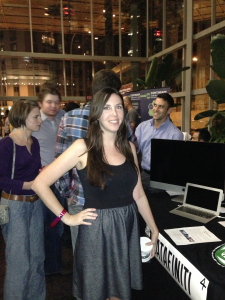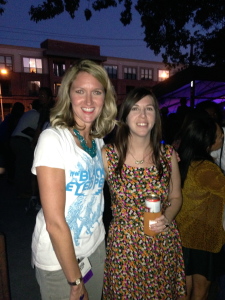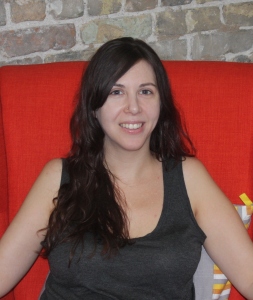BY SUSAN LAHEY
Reporter with Silicon Hills News

Jacqueline Hughes at Austin Startup Crawl last year at Capital Factory, photo by Laura Lorek
Jacqueline Hughes seems the antithesis of a typical event coordinator—what Austin Technology Council’s Grover Bynum calls “whistle and clipboard” people. Event coordinators have reputations for being frenetic, type A, wearing frozen, stressed smiles. Hughes, curled up in an easy chair at Techstars Austin, seems relaxed, chill, though she’s in the midst of putting final touches on several major events including her own creation: Austin Startup Week. She’d worked all night until 7 a.m. and was back in the early afternoon to do more.
“It’s kind of exciting to email someone at three a.m. asking for something you need and getting an answer back immediately,” she laughs. “It’s like ‘You are crazy too! What’s wrong with you? Who stays up working until three in the morning?’”
Hughes does. Regularly. Ever since she got introduced to the Austin tech community with her job as community manager for an Austin co-working site, she’s become a fixture at nearly every tech event, many of which she planned and executed. She not only created Austin Startup Week, she’s been either chief planner or involved to her elbows in numerous other events including several major events for Techstars, Made in Austin Career Fair, Rise Week and many SXSW events. The sociology major from Texas State University has become an expert in the sociology of Austin tech. It lets her exercise two of her favorite things: Getting to know interesting people and creating fun events.
The Person Behind the Community
“Sometimes, there are people out front and when you dig a little bit deeper, you find the person behind the person,” said Jason Seats, managing director of Techstars Austin. “I feel like Jacqueline’s the person behind the community. Almost anything that’s happening here, she’s really just one hop away from it, even the things she’s not directly involved in. She knows how all these things plug together, what’s involved, what kinds of things people like to do and don’t like to do. I feel like calling her a connector is underplaying it… I would be hard pressed to pull someone out of the startup community that she hasn’t done something for.”
In a town with more events than calendar days, planning something unique and fun is a huge challenge. Hughes’ take on it is: “I like to see people have fun. I like to see them happy.”

Julie Huls, President of Austin Technology Council with Jacqueline Hughes, founder of Austin Startup Week, at the ATC Battle of the Bands last year, photo by Laura Lorek
“What I observe her doing is she gets a rough plan and then she walks through it over and over in her mind,” Seats said. “Every time, she thinks up 15 more small details. Maybe this isn’t the right door for people to go in, because traffic clogs here. ..she likes people to have fun and enjoy themselves and that’s the mindset she has on. ‘Okay, I’m Joe Schmo, what will I think when I walk in? What am I going to see? Will be the music be too loud in this area? Will I be able to meet people? Will I feel awkward?’”
At the same time, Seats said, “She lets things happen the way they’re going to happen.”
Bynum, ATC senior advisor, said Hughes is not only incredibly laid back, but also transparent and eager to collaborate, let events evolve organically, give other people a voice in what the event will eventually become.
“She’s an excellent national ambassador for the city,” he said. “She recognizes that the value of Startup Week is still being determined and instead of trying to figure out what it is, she understands the community, lets different approaches be heard…she introduces the value and lets people chew on it.”
One Startup Week, he said, he wanted to bring his policy and advocacy background into the mix and offer a serious discussion on Internet policy led by a national advocacy group at City Hall. “We really didn’t know what the uptake was going to be,” he said. Though they had some concerns that the event—being less sexy and festive than other sessions—might not draw participants, Hughes encouraged Bynum to go for it. “It turned out we had a full house at City Hall when it might have just been me. That’s been a successful piece of Startup Week ever since.”
Falling Into the Startup World
In many ways, Hughes fell into the startup world and the world of event creation. A product of the Houston suburbs and its traditions—like Cotillion—she discovered a whole new world of interesting, passionate people when she went to Texas State for College.
“I had these amazing teachers,” she said. One class, A People’s History of the United States, gave her a completely new view on the world. “It was the first time I kind of learned that Christopher Columbus wasn’t the nicest guy in the world….I was interested in studying values and norms and it opened my eyes to the fact that I don’t have to fit into a square or a circle.”
 She was living in Austin, a year into her master’s in sociology, when she decided to look for a program where she could get a Ph.D on environmental sociology and she and her boyfriend at the time planned a road trip to schools in Colorado, Utah, California, Oregon and Washington to find the right programs. Then they broke up. On the one hand, her plan had now disappeared and she was a little lost. But around the same time, her grandparents left her $20,000. She took off for London, then returned to the U.S. and spent the rest of the year making the money stretch, taking road trips all over the U.S. and spending tons of time alone.
She was living in Austin, a year into her master’s in sociology, when she decided to look for a program where she could get a Ph.D on environmental sociology and she and her boyfriend at the time planned a road trip to schools in Colorado, Utah, California, Oregon and Washington to find the right programs. Then they broke up. On the one hand, her plan had now disappeared and she was a little lost. But around the same time, her grandparents left her $20,000. She took off for London, then returned to the U.S. and spent the rest of the year making the money stretch, taking road trips all over the U.S. and spending tons of time alone.
“I loved it,” Hughes said. “I felt very free. I had this couch on the porch and I would lay on it and read (Harry Potter among others), then fall asleep, wake up, read some more. I napped during the day and only slept three or four hours at night. At one point I went to get a massage and the massage therapist said ‘You don’t have any stress…at all.’ I’m really glad I had that time. I don’t think a lot of people get to have that.”
But eventually the money was running out and it was time to get a job. She was living in Austin and knew networking was key. She got a Twitter account and started connecting with people and going to events. “Someone on Twitter told me about TabbedOut, Foursquare, I started thinking about what else you could do with apps.” This was another whole new world. When she started meeting techies and geeks, she didn’t even know there was code behind websites. But once again, she was surrounded by interesting people tackling cool projects.
After sending out 100 resumes, Hughes was hired to build membership at a co-working space. That year she attended 300 events, going from a life of near total solitude to one surrounded by people.
Bridging the City
“I spent time just meeting people for about six months,” she said. “I was that person who showed up at everything. That was what I was known for, just knowing people. I didn’t think that was really admirable. It came sort of naturally to me to meet people. I have a really good memory. I don’t remember movie quotes or actors but I’ll remember when I first met someone, where it was, what we talked about. People started putting me on a pedestal because I knew so many people. I felt like a phony, like that’s the only skill I have? So I decided to start working on my own startup.”
Hughes wanted to create a platform that would have all the city’s events listed in one place, without having to input the data. It was called Bridge the City and it was to be similar to Foursquare’s new Swarm app.
“One thing I think Foursquare is not as good at is, if I was going to Refresh Austin and it was at Buffalo Billiards, I wasn’t headed to Buffalo Billiards—I was headed to Refresh Austin.” Bridge the City would focus on the events and make it easy to find the people you wanted to meet at those events, something she said no app does well, even still.
She and her cofounders spent three months working on it, then they split up.
“We came together wanting to solve the same problem, but couldn’t align on how to get there. After we released a MVP — an events calendar – we began struggling with direction. Half of the team wanted to build something simple similar to what Swarm looks like, the other half envisioned something closer to what Do512 looks like today. In the end, neither side was willing to compromise and we split up. I think the team was looking to me to steer us in the right direction, and I didn’t step up.”
The Birth of Startup Week

Jacqueline Hughes, photo by Susan Lahey
Hughes still had the co-working job and started working with startup Qrank, but neither was full time. One day, when she was planning a trip to San Francisco, she created a pitch to ask the CEO of Plancast whether he was interested in hiring her to do community management for that company as well. He hired her. The idea for
Austin Startup Week came after Hughes realized that people in Boulder were using the app in a really “interesting way.” Plancast sent her to Boulder where she was introduced to Boulder’s Startup Week. The organizer gave her permission to borrow as many of their ideas as she liked.
The consummate event attender, Hughes wanted to put a lot of the area’s startup activities in the same week and anchor them with something like a UT or Capital Factory demo day. Josh Baer was the first person she approached.
“I wouldn’t say I’m a very good event planner but I’m a very good event creator. I’m really good at figuring out what’s fun. I like to create fun experiences for people…. I’ve worked with some event planners who were amazing. They make my life so much easier. They go through everything I’ve done to make sure I’m not leaving anything out.”
The first Austin Startup Week was in 2011 and those early budgets were meager. One good thing about that was that they had to ferret out interesting locations, like GSDM’s entryway, that could accommodate both their budget and their crowds. Sponsors covered specific events, usually to the tune of a few hundred dollars. But this year the organization decided to take on one big sponsor for each day of the event. Some of the early sponsors included Indeed and AT&T. Meanwhile, Hughes has been responsible for more than 50 events—everything from dinner parties to Startup Week.
She’s become to go-to events person for Austin Techstars.
“I love working for Techstars,” she said. “I have never worked with a group of people who work so hard. Everyone on the team is just so good at the things they’re good at and they trust me to own and be good at the things I’m good at.”
One of the most recent events she threw for Techstars was a retreat at Marfa. She remembered the last night, when they hadn’t brought a cooler so she lined a grocery cart with trash bags and filled it with ice for beer and Seats and a couple others pulled out their guitars and played under the starlight.
“Things that are easy to do in other places are not easy to do in Marfa,” Seats said. “Just finding seating for 40 people at once and catering—we had to have four or five different restaurants cater together when we were on that trip…I think she surprised herself at how well that worked out. It could have been horrible but every part of it was so over-the-top perfect.”
Hughes knows she’s the kind of person who could work herself into the ground. Her four-year-relationship with her boyfriend, Scott Gress, helps her to stay balanced. Gress, who is also working on a startup is an intense worker too. But he helps her know when it’s time to turn off the computer and say she’s done for now.
One day, Hughes wants to be an investor. Starting a business is so hard, she said, she wants to be able to support people’s entrepreneurial ventures. Meanwhile, she’s still more comfortable being the person in the background, making things happen.
“I would love for her to become more comfortable owning the recognition for the stuff she does at this level,” said Seats. “She does so many things for so many people and they get the credit, which is noble and nice and we all are the beneficiaries of it.”

